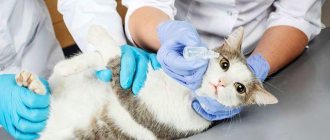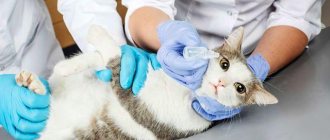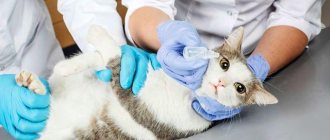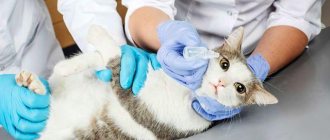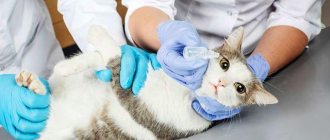Cats are cute creatures, but they not only purr and cuddle, but also scratch. And sometimes they bite, and it’s quite painful, leaving deep wounds with sharp teeth. Bites from outdoor cats are especially dangerous because their saliva contains harmful bacteria. And if the damage is not treated in time, it can lead to serious infections. In addition, such wounds are known to heal slowly and poorly, leaving scars on the skin. What to do if your hand is swollen after contact with a cat? It is necessary to immediately treat the wound and consult a doctor for treatment.
Why is a cat bite dangerous?
Ignoring treatment for a cat bite will lead to various complications such as tetanus and rabies. Although the cat's injuries are minor, the closed nature of the wounds makes them very difficult to treat. But in most cases, a bacterial infection penetrates under the skin, and this is unsafe for humans, especially with low immunity. Therefore, cat bites should not be treated with disdain, especially if there has been an “acquaintance” with a stray animal. The presence of pathogenic bacteria in the mouth causes inflammation, and such an injury is then very difficult to cure.
What does a cat bite look like?
Cats, unlike dogs, cannot cause serious injuries. Due to weak jaws and smaller teeth, bites are not as bad, but no less dangerous. Dog bites heal faster than cat bites because they are open wounds rather than closed wounds, as they are after contact with cats. Their thin and small, but sharp teeth penetrate deeply into the muscle tissue, leaving small punctures on the skin. At first they look like a few dots, not inspiring any fear, but gradually the damaged area of the body swells, the bites become covered with scars and look frightening.
First aid for a cat bite
What to do if bitten by a cat? Remember that the sooner you treat wounds, the less consequences there will be. Therefore, first aid for a cat bite should be timely. To avoid complications, you need to take the following steps:
1. Rinse the bitten area with running water for ten minutes, soaping it from time to time with household (not toilet!) soap, it contains alkali. This will help wash away saliva that contains dangerous bacteria.
2. Then the injured area must be treated with hydrogen peroxide or chlorhexidine; a solution of furatsilin is also suitable - these drugs do not leave burns on the skin. The edges of each wound must be lubricated with brilliant green or iodine.
3. Next, apply an antibacterial agent to the washed and treated area. Suitable drugs: Levomekol, Tetracycline ointment, Gentamicin, Actovegin, Dioxidin, Fusiderm, Tyrosur and Heliomycin.
4. The last stage is the application of a sterile dressing. Make it loose, this measure is only necessary to prevent dust from getting into the wound. After some time, remove the bandage and apply the ointment again.
If you are bitten by a domestic cat, in most cases home treatment is sufficient. But if you have dealt with a barn cat, then after providing emergency assistance, consult a doctor. The doctor will examine the wound and prescribe the necessary treatment.
How to treat a cat bite
Even if the wound does not seem to cause any concern at first glance, visit a doctor just in case. After all, if you are bitten by a cat you don’t know, there are a bunch of dangerous microbes in its saliva! Do not rule out that the animal is infected with rabies, and if there is even the slightest suspicion, a special serum is injected into the victim. Sometimes, in parallel with it, the patient receives a dose of tetanus vaccine as a preventive measure. Antibiotics are also prescribed, Clavunat or Fluoroquinol, take them for five to ten days.
What not to do about cat bites
When providing first aid, you can both help and harm. For example, many people make the mistake of pouring iodine onto the wound after a cat bite. This should absolutely not be done, otherwise the situation will be aggravated by a burn. In this situation, you only need to carefully lubricate the edges of the wound with iodine. Another common mistake is the use of anti-inflammatory drugs. Only antibacterial ointments can be applied to the area damaged by the cat, the rest - only with the permission of a doctor. And also do not self-medicate by taking antihistamines without prescription.
Folk remedies for a cat bite
Traditional medicine is a collection of ancient recipes that have been tested by time. Modern medicines were invented not so long ago, but cats have always scratched and bitten. Since ancient times, people have treated such injuries using folk remedies. Of course, they are, alas, powerless against tetanus and rabies, but they are able to cope with healing wounds and relieving inflammation. We offer five very effective recipes.
Calendula. Make a compress from a ready-made pharmacy tincture of calendula, or prepare a decoction from the raw materials of this plant. Simply moisten gauze folded several times with a decoction or diluted tincture and apply to the wound.
Immortelle. Brew one tablespoon of immortelle flowers overnight, strain in the morning, and drink literally a couple of sips three times a day. There is no need to apply it to the wound, take it orally. This will help relieve inflammation and speed up healing.
Symptoms of rabies in humans
Signs that a person is infected with rabies most often occur if they are bitten by an outdoor cat. In such cases, it is not recommended to limit yourself to first aid; you must immediately go to the emergency room. There is a high probability that a stray animal will become infected through a bite. Symptoms of rabies in a person after interacting with a cat are not difficult to recognize; the victim’s condition worsens, weakness appears, body temperature rises, the wound festers and becomes inflamed, and bleeding is possible. And you can’t do without treatment.
It is important for every person to understand that signs of rabies do not appear immediately. If you are bitten by a cat, then other than a swollen affected area and painful sensations, you will no longer feel any discomfort. Negative symptoms will appear later, after a week, or even three (depending on where the bite was made). What are these signs? The victim begins to be disturbed by bright light, even to the point of photophobia, and it is uncomfortable to hear loud sounds, which are terribly annoying. In some cases, problems with swallowing and body aches appear. It is important to consult a doctor promptly.
If bitten by a mad cat
In this case, you need to act clearly and, most importantly, quickly - provide first aid, and then immediately go to the emergency room!
If you or a child is bitten by a cat on the street, you need to urgently treat the wound and then apply a semi-alcohol bandage. If it is possible to observe the biting animal, this should be done to determine its health status. When a cat dies or disappears, it is automatically considered infected with rabies. In this case, the person bitten will certainly undergo a course of vaccination.
When to see a doctor
It doesn’t matter what area the cat bite occurred in, even if there was a one-time bite on the finger, consultation with a doctor is mandatory, especially if the bite was from a rabid cat. Providing first aid is necessary and very good, but you shouldn’t stop there. Otherwise, there are disastrous consequences, from necrosis to amputation. When should you consult a doctor if you have been bitten by a wild stray cat, and what complications may arise?
- Bites on the neck and face - in this case, immediately run to an infectious disease doctor!;
- In case of severe bleeding that cannot be stopped;
- Sudden decline in general condition, poor health and weakness;
- A sharp increase in temperature that cannot be brought down with medications;
- If the wound becomes inflamed, red or blue, pus begins to ooze;
- In contact with a stray cat because it is not vaccinated against rabies.
If you consult a doctor immediately after a cat bite, within 12 hours, you will have every chance of neutralizing the infection without undesirable consequences. The doctor will inject the necessary serum and prescribe the necessary antibiotics.
In what cases is medical help needed?
If the arm or leg that was bitten by a cat is red, swollen and painful, this is a reason to immediately seek medical help. Self-medication will lead to serious complications until the damaged limb is removed.
Redness after a bite
If you are bitten by a cat, you should contact a medical facility in the following ways:
- A bite with a large area and depth of damage.
- A joint or the area of the neck and face, or the scalp has been bitten.
- Heavy bleeding that cannot be stopped for more than a quarter of an hour.
- Deterioration of general health, malaise.
- Chills, fever, high temperature.
- The wound hurts, is red and swollen.
- If you are bitten by a stray cat or an unvaccinated domestic cat that has free access to the street.
If one of the listed symptoms appears, you need to go to the emergency room. Preferably within 12 hours after injury.
As a rule, the area of the bite wound is treated with an antiseptic solution. If necessary, apply a bactericidal dressing.
Observe the condition of the victim for at least two days. If within 24 hours the wound has not turned red or swollen, body temperature and general health remain unchanged, the bite is treated without prescribing antibacterial therapy.
An antibacterial drug with a broad spectrum of action is usually prescribed.
In each case, after a cat or dog bite, especially an unknown one, a tetanus vaccination is given at the trauma center. The victim is given a special tetanus vaccine according to a specific schedule. If indicated, an additional rabies vaccination is given.
Visiting a trauma center
Possible consequences after cat bites
Dangerous complications that provoke cat bites are tetanus and rabies. But even if these diseases are avoided, the consequences of a cat bite are no less serious. We are talking about infectious lesions that arise due to the presence of staphylococci and streptococci in the saliva of animals. They are the ones who provoke inflammatory processes in the body, which will lead to the most disastrous consequences. Namely: sepsis (blood poisoning), tissue necrosis, signs of suffocation, body aches and kidney failure. This is especially dangerous for people with weakened immune systems and diabetes.
Treatment of a bite
You should not stitch up a cat bite. If the bleeding is intense, in selected cases the damaged vessels are sutured. If the damage is extremely extensive, it is initially treated conservatively. After the bite site has healed, in the absence of signs of inflammation, it is possible to perform cosmetic surgery.
If a child is bitten by a domestic vaccinated cat that does not go outside, it is enough to treat the wound and apply a bandage.
If a cat bite causes swelling in your leg or arm, you should immediately seek emergency medical attention and take antibiotics. Otherwise, the inflammatory process will spread to the periosteum or into the joint cavity.
Preventing cat bites
To avoid a cat bite from a domestic cat, the following measures must be observed:
- If your pet likes to bite, you should not provoke it again;
- Visit your veterinarian regularly and get all the necessary vaccinations;
- Buy your pet a toy that she will happily bite;
- If your cat does not like affection, then it is better not to pet it too much;
- Stop aggression in a kitten, this is important in education.
What should you do to avoid being bitten by a stray cat? Here are the recommendations you need:
Surgeon, coloproctologist, phlebologist. Area of professional interests: treatment of surgical and trauma patients, including minor outpatient operations (removal of skin and subcutaneous tissue tumors) using surgical, radio wave and laser methods in dermatology (removal of atheromas, lipomas, nevi, papillomas, warts). Minor proctology in full (laser hemorrhoidectomy, hemorrhoidectomy with the Surgitron radio wave apparatus).
Which doctor should I contact for a cat bite?
Is a cat bite dangerous for humans?
Even the most innocent pet can become aggressive. An animal can be provoked by both children who tease it and adults. If a cat bites, it means that it imitates the behavior of its owners, anticipates danger or feels discomfort from excessive attention and love. Scratches, abrasions and wounds left by animals have a negative impact on human health. Any veterinarian, surgeon or traumatologist will explain why a cat bite is dangerous. The consequences can be unpredictable, ranging from an unpleasant, painful scratch or wound to a serious infection or infection.
It is a mistake to believe that animal diseases are not dangerous to humans. Most of them may not appear immediately, but after the incubation period, which is observed in the first 12 hours and lasts up to 10 days. How dangerous a cat bite can be:
Cat scratch disease
This infectious disease becomes a frequent complication of a cat bite. The correct name of the disease is lymphoreticulosis.
The exact causes of the disease are still unknown. Viruses were thought to be the causative agents. Then the “palm” was given to rickettsia, and sick people were considered the source of infection.
Children of preschool and school age are most susceptible to the disease. The cat serves as a carrier of infection, the causative agent of which is in the saliva. When licking the paws, the factor gets onto the claws. If a claw scratch or bite is made, the pathogen enters the wound, which begins to swell. After three days, inflammation spreads to nearby lymph nodes.
Symptoms of general intoxication develop - fever, headache, general malaise, aching joints. A characteristic symptom is a red stripe from the bite site to the regional lymph node. The outcome of the disease is predominantly favorable; complications such as inflammation of the meninges occasionally develop.
If the disease is acquired from a domestic cat, the animal must be isolated for 21 days. After the expiration date, the cat poses no danger. Unfortunately, it is impossible to determine in advance whether a domestic cat is a source of infection.
In addition to rickettsia, a whole “bouquet” of pathogenic bacteria are isolated in the saliva of cats: pasteurella, streptococcus and staphylococcus, corynebacterium and a range of other representatives of opportunistic microflora.
Which doctor should you go to if you are bitten by a tick?
In this case, you need to quickly consult a doctor; the correct option would be to call an ambulance at home, and there the doctors will determine where to take the patient.
But even if you are bitten by a tick and you don’t know whether it is infected or not, you still need to see a doctor, in this case you should not go to see a therapist or surgeon, there are eternal queues, and you can spend a lot of time at the reception desk, but here I need quick help because... Every minute is precious, so you just need to go to the hospital emergency room and they will immediately provide you with first aid.
A tick bite can be uninfected or infected, but... if such a situation does occur, then in any case you need to go to a medical center to remove the tick. After extraction, the tick is properly sent for analysis (research) so as not to worry about whether there is an infection or not.
If you are bitten by an uninfected tick, the swelling usually goes away after 2-3 days, but if you are bitten by an infected tick, the whole body becomes infected, and the symptoms of a tick bite may intensify.
If you do not consult a doctor in time for extraction, infection may occur; usually, a surgeon ; in this case, the doctor prescribes a course of treatment.
Go to the first one you come across, or rather the nearest clinic or hospital, and tell the nurse in the emergency room or at the reception desk about your problem (that you were bitten by a tick). There is no need to take a coupon or wait in line to go to a specific doctor.
To me in the spring, a few years ago in the navel. A tick climbed in and attached itself, I felt that something unpleasant was happening there, I looked, and there was this “animal” sitting there. My husband and I were passing by the cafe at that moment. We came in and asked for a teaspoon of vegetable oil, having first explained my unpleasant situation.
Source
Cat Bite - Is It Dangerous?
But! But despite all their cuddliness, our pets are animals. Moreover, they are predators. And they have weapons for defense and attack - these are their teeth and claws. And even the kindest cat can use them one day. And we must not forget about this!
Everyone has probably noticed how long and painfully cat bites and scratches take to heal. If they finally healed, that’s good. You could say I was lucky. Alas, this does not always happen. Here are some examples taken from online forums:
Bites from cats and cats
Cats' teeth are sharp and thin; they cause puncture wounds, although small, but very deep and closed. The oral cavity and saliva contain a large number of pathogenic microorganisms, which, when bitten, are “delivered” to the deep layers of tissue, causing severe infections (infection in almost 50% of cases).
Swelling, redness, suppuration, spread of infection up to the development of sepsis (blood poisoning) - these are the possible consequences of cat bites.
Dangerous bacteria can be found in 90% of cats. The most common is Pasteurella multocida (the causative agent of pasteurellosis, an infection with septic manifestations). This bacterium can interact with staphylococcus and streptococcus bacteria on human skin and cause major health problems.
Most often, bites occur on the hands. Our wrists and hands are equipped with tendons, joints, and muscle nerves. Damage to the muscles leads to decreased motor function, and if pasteurellosis develops in the tissues of the hands, the bacteria can infect tendons and even bones.
According to statistics, 13% of animal bites are cat bites that require immediate medical attention. Bone infections, the development of sepsis, and surgical cleaning of deep wounds lead to hospitalization.
Source
Which doctors should you contact in case of complications, which doctor should you go to in case of pain and health problems. The portal also contains a lot of educational information on medical topics.
Friday, November 11, 2016
Monkey bites
Scale of the problem
Monkey bites account for 2–21% of animal bite injuries. In India, for example, two studies have shown that monkeys are the second most significant source of animal bite injuries after dogs.
Who is at greatest risk?
Monkey bites pose a significant risk to travelers and, after dog bites, are the second most common animal bite for travelers.
Treatment
Treatment depends on the patient's health, the location of the bite, and whether the monkey is suspected of having rabies. The basic principles of medical care include the following:
- prompt medical treatment, including wound cleansing;
- prophylactic antibiotic therapy to reduce the risk of infection;
- post-exposure treatment of rabies depending on the animal's vaccination status;
- administering tetanus vaccine when the affected person is not properly vaccinated.
Preventing Monkey Bites
Individual communities and travelers should be educated about the risks of monkey bites and how to prevent them.
Health care providers must receive specialized training in the proper management of these injuries. Health authorities and policymakers should ensure control of rabies in monkey populations and adequate supplies of drugs for post-exposure treatment and prophylactic antibiotic therapy in human bite victims. They should also support scientific research aimed at obtaining more information about the burden of monkey bites.
Which doctor should I contact if I have an insect bite?
Bitten by a tick - where to go
Ticks are potential carriers of dangerous infectious diseases. The most common of these are Lyme disease and tick-borne encephalitis.
Don’t worry, we know who to contact if you’ve been bitten by a tick – this is, first of all, a therapist. If you do not decide to remove the tick yourself, which, by the way, is correct, a surgeon will do this. And after the initial procedures, an infectious disease specialist will take care of you. This doctor will determine whether you got any illness from the insect bite.
What to do if bitten by a wasp
Some people are prone to allergic diseases. Insect venom can cause a life-threatening allergic reaction.
Anaphylactic shock is considered one of the most serious complications that occurs after a wasp sting. A person can die within minutes.
If you have an allergic reaction, it is better to first consult an allergist. In any case, you can visit a therapist. And with a pronounced tumor, the help of a surgeon is sometimes required.
The consequences of bites from midges, spiders, hornets and other insects depend on the type of poison produced by the insect and the tendency to allergies. Therefore, the choice of doctor depends on each individual case.
. In any case, it is better to contact a medical institution and not let everything take its course.
Snake bites
Scale of the problem
Up to five million people around the world are bitten by snakes every year. Among this population, venomous snakes cause significant morbidity and mortality. There are an estimated 2.4 million cases of envenomation (poisoning from snakebites) and 94,000–125,000 deaths each year, as well as 400,000 amputations and other severe health effects such as infection, tetanus, scarring, contractures and psychological consequences. Poor access to medical care and shortages of antitoxins increase the severity of injuries and their outcomes.
Who is at greatest risk?
Most snakebites occur in Africa and Southeast Asia. Snake bites are most common among people living in rural areas with limited resources and engaged in low-wage, non-mechanized field cropping and other forms of agriculture. Agricultural workers, women and children are the groups most frequently affected by snake bites. The burden of these injuries is compounded by their socioeconomic impact on families and communities. Adult victims are often the breadwinners of the family and caretakers for other family members; and child victims may suffer lifelong disabilities, imposing additional costs on families and communities.
Treatment
There are approximately 600 species of venomous snakes in the world, and approximately 50-70% of their bites result in intoxication. Immediately after a bite, it is extremely important to ensure complete immobilization of the affected part of the body and immediate delivery of the victim to a medical facility. Applying tourniquets and cutting out the bite site should not be used as first aid, as this may increase the effects of the venom. Often, snakebite victims require treatment with an antitoxin. It is important that the appropriate antitoxin is used based on the snakes endemic to the area. Additional measures include wound cleansing to reduce the risk of infection, supportive care such as respiratory support, and administration of a tetanus vaccine at discharge if the patient is not adequately vaccinated against tetanus.
Preventing Snake Bites
In order to prevent snakebites, it is necessary to educate local communities about the risks of snakebites and methods of preventing them, such as:
- avoid areas with tall grass;
- wear safety shoes/boots;
- do not allow rodents into food storage areas;
- clear the area adjacent to the house from debris, firewood and low vegetation;
- in homes, store food products in containers that reliably protect them from rodents, arrange sleeping areas at a raised level above the floor, and carefully tuck mosquito nets under mattresses.
To prevent or limit the serious health consequences of snakebites, health care providers should have specific training in the management of snakebites, including the appropriate use and administration of antitoxin. Public health authorities and policymakers must ensure adequate supplies of safe and effective antitoxins at the community, national, and regional levels where they are most needed, and prioritize research initiatives that will bear on the burden of such injuries.
Who to go to after a tick bite
During the warm season, the risk of contracting infectious diseases transmitted through the bites of various insects increases significantly. A situation such as a tick bite should never be ignored.
For lovers of active outdoor recreation, you should develop a useful habit of carefully examining exposed areas of the body and, if you suspect a tick bite, immediately see a doctor.
First of all, you need to know which doctor to contact for medical help. It is strictly not recommended to independently use such treatment methods as applying compresses, ointments, or taking any medications. Only a qualified doctor can prescribe the necessary course of treatment and carry out all preventive measures.
Which specialist should you contact?
If you find yourself with a tick bite, you should not panic. First, try to carefully remove the insect from the skin. After this, the tick must be sent to the laboratory, where it will be thoroughly examined. This procedure is necessary because ticks can carry dangerous infectious diseases such as tick-borne encephalitis and borreliosis.
If you were unable to remove the tick from the surface of the skin, then you should not worry. In such a situation, you need to contact an infectious disease specialist
, who, using a special tool, will remove the insect and send it to the laboratory. If your hospital does not have an infectious disease specialist, a surgeon can remove the tick.
Main signs of bites
After a holiday outside the city or a simple walk in the park in spring and summer, you need to carefully examine your skin for bites of various insects. Favorite locations for tick bites are:
However, bites can also be found on any other areas of the skin. In the cut
Source
Is a cat bite dangerous for humans?
Even the most innocent pet can become aggressive. An animal can be provoked by both children who tease it and adults. If a cat bites, it means that it imitates the behavior of its owners, anticipates danger or feels discomfort from excessive attention and love. Scratches, abrasions and wounds left by animals have a negative impact on human health. Any veterinarian, surgeon or traumatologist will explain why a cat bite is dangerous. The consequences can be unpredictable, ranging from an unpleasant, painful scratch or wound to a serious infection or infection.
What can you get infected from a cat?
It is a mistake to believe that animal diseases are not dangerous to humans. Most of them may not appear immediately, but after the incubation period, which is observed in the first 12 hours and lasts up to 10 days. How dangerous a cat bite can be:
rabies. Damage to the central nervous system is caused by Rabies virus. Sensitivity to light and water, convulsions, hallucinations, increased salivation, muscle spasms - symptoms of rabies in a person after a cat bite;
toxoplasmosis. Helminthic infestation, the source of which is the parasite Toxoplasma gondii. Signs of the disease include diarrhea, blurred vision, myocardial damage, enlarged lymph nodes; children develop hydrocele, urticaria and tissue necrosis of internal organs.
pasteurellosis. The causative factor is the bacterium Pasteurella multocida. A sick person experiences fever, purulent and inflammatory processes in the body, vestibular complications, otitis media, damage to the genital organs;
sporotrichosis. A fungal infection that causes damage to the lungs, joints and muscles, skin and lymph nodes
Source
Dear forum members! Use the gallery for your device! You can repost photos from it, which increases the chance of finding a new home. It's fast and completely free!
Dear sponsors and patrons of the forum! The forum administration monitors compliance with the Rules for the provision of financial reporting, but cannot verify all financial receipts for all forum topics. Please, when transferring funds to the topic, do not hesitate to write about it in the topic, track their timely reflection in the report and intended use. If necessary, contact the forum moderators for help.
Currently I have a swollen, stiff finger at the joint with swelling on the side (the hole flows like ichor when pressed), but it doesn’t hurt. And a red, swollen hot spot with a triangle between the thumb and forefinger and the same red stripe from it along the wrist and to the inner bend of the elbow. Touching red hurts, but it doesn’t hurt in itself.
Yes, she doesn’t seem to have a fever at all and doesn’t even have a headache (I was a little sick in the morning because I didn’t get enough sleep). I'm going to see a doctor in the morning, I just need to decide which one.
For a cat bite, the best remedy is ALCOHOL or vodka. and 2 tablets of an antihistamine right away. Hydrogen peroxide will only stop the bleeding.
I strongly recommend going to a doctor, no matter which one - a surgeon or a traumatologist. I liked (so to speak) the treatment from traumatologists more. I had a similar situation - with inflammation of the lymphatic ducts (those same red stripes). True, it was not a cat that ate me, but a Caucasian, but in this case it doesn’t matter. But the important thing is that, due to lost time, I almost lost my arm and underwent 3 operations.
Tomorrow I will go to the medical center in the morning. As I understand it, the injury will still be sent to a doctor by appointment. Now it’s too late, and nothing hurts, even hitting the clave with your finger is fine, but you can’t bend the striped one completely.
Popular questions and answers
How to avoid a cat bite?
– If you see an adorable stray kitten on the street, you shouldn’t pet it immediately. And in general, you shouldn’t touch a cat (no matter whether it’s your friend’s cat or a stray) if it’s not your pet. You never know what to expect from an animal. So, the first piece of advice is to stay away from other people's animals. To prevent your own cat from inadvertently biting you, try to prevent the animal from feeling afraid. Bathing, a trip somewhere out of town in a carrier, a trip to the veterinarian, exhibitions - this can cause stress in the animal, so it is worth accustoming it in advance to avoid scratches and bites, explains felinologist Sergei Zabolotny.
Why do cats bite?
– Cats bite in two situations: during play (which is unacceptable, this is a lack of education), or in a stressful situation, when they are in pain or very scared. For example, even the most good-natured cat can severely bite its beloved owner during some painful veterinary procedure. Cats can also bite when stressed, when they are taken out from somewhere, taken outside, where there is a lot of extraneous noise, and restrained by force. This reaction is normal, it can be predicted and controlled. Therefore, cats are accustomed to exhibitions and trips, for example, gradually, as well as to the bathing procedure. Options when an adult animal attacks its owner or house guests are either early weaning from its mother (the kitten was taken before 2 - 2.5 months and its socialization is impaired). Or a sign of illness, most often severe pain, for example with oncology,” explains felinologist Sergei Zabolotny.
Which cat breeds attack more often?
– I would not say that any particular breed is more prone to aggression than others. This is rather a disadvantage of raising a particular cat. It’s just that some will express their dissatisfaction loudly and for a long time (Bengal cats, for example), and some will silently endure everything. But under extreme stress, absolutely any cat can bite. Although under normal home conditions they do not experience such stress, the felinologist emphasizes.
Do I need to get a rabies vaccine after a cat bite?
“Vaccination against rabies after a cat bite is mandatory, because rabies is a deadly disease, and today there are no drugs for its treatment,” explains traumatologist Vadim Fadeev.
What signs of rabies can a person have after being bitten by a cat?
– The incubation period for rabies is quite long, up to one year, so a person may not even suspect that he is infected for a long time.
At the first stage, the infected person may notice redness at the site of the bite, swelling and burning. Mood changes appear - anxiety, apathy. The patient complains of headaches and depression. The temperature may rise slightly. At the next stage (stage of hyperarousal), the patient exhibits increased agitation, aggression, fear of water, bright light and loud sounds. Convulsions, breathing problems, and laryngeal spasms may occur. The patient complains of severe salivation, weight loss, dehydration and metabolic disorders are noted. At the last stage, the stage of paralysis, mental disorders subside, hyperexcitation is replaced by immobilization, paralysis of cardiac and respiratory activity occurs - and, as a consequence, the death of the patient. That is why it is important to get vaccinated against rabies in a timely manner after being bitten by an infected animal, explains traumatologist Vadim Fadeev.


